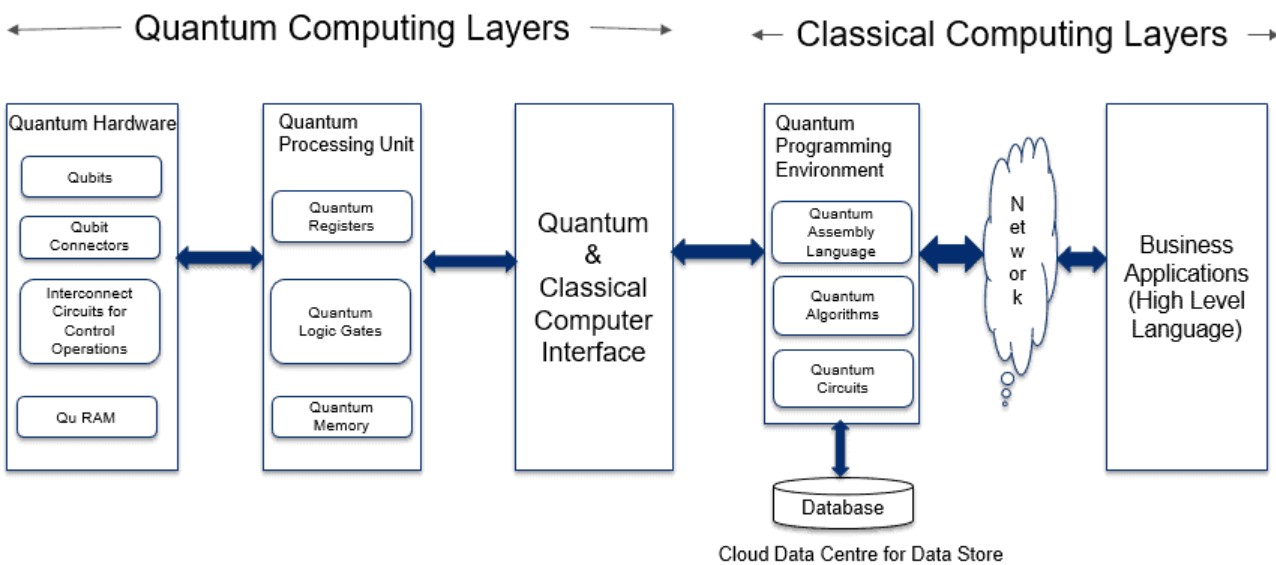Quantum computing
Quantum computing is a cutting-edge field of computing that leverages the principles of quantum mechanics to perform certain types of computations significantly faster than classical computers.
While classical computers use bits as the fundamental unit of data (representing 0s and 1s), quantum computers use quantum bits or qubits.
Qubits can exist in a superposition of states, allowing quantum computers to process a vast amount of information simultaneously.
Some key concepts and aspects of quantum computing:
-
Qubits:
- A qubit can exist in multiple states at once due to the superposition principle. This allows quantum computers to perform parallel computations, making them potentially much faster for specific tasks.
- Qubits can also be entangled, which means the state of one qubit is dependent on the state of another qubit, even if they are physically separated. This property is exploited for various quantum algorithms.
-
Quantum Gates:
- Quantum gates are the quantum computing equivalent of classical logic gates (e.g., AND, OR, NOT). They manipulate qubits by performing operations like rotations and flips, allowing quantum computers to process information.
-
Quantum Algorithms:
- Quantum computers have the potential to solve certain problems more efficiently than classical computers. One famous example is Shor's algorithm, which can factor large numbers exponentially faster than the best-known classical algorithms. This has significant implications for cryptography.
- Another important algorithm is Grover's algorithm, which can speed up database search and optimization problems.
-
Quantum Supremacy:
- Quantum supremacy refers to the point at which a quantum computer can perform a specific task faster than the most powerful classical supercomputers. In 2019, Google claimed to have achieved quantum supremacy with a 53-qubit quantum processor.
-
Quantum Error Correction:
- Quantum states are highly susceptible to errors due to environmental factors. Quantum error correction codes are essential to mitigate errors and make quantum computations reliable. These codes involve encoding qubits in a way that errors can be detected and corrected.
-
Quantum Hardware:
- Building practical quantum computers is a significant engineering challenge. Several approaches are being pursued, including superconducting qubits, trapped ions, and topological qubits. Companies like IBM, Google, Intel, and startups are actively working on quantum hardware development.
-
Applications:
- Quantum computing has the potential to revolutionize various fields, including cryptography (breaking and enhancing encryption), optimization (solving complex optimization problems), drug discovery (simulating molecular interactions), and materials science (discovering new materials with desired properties).
-
Challenges:
- Quantum computing is still in its infancy, and many technical challenges need to be addressed, including qubit stability, error correction, and scaling up the number of qubits.
- Quantum computers are not faster than classical computers for all types of problems. They excel in specific domains but may not replace classical computers entirely.
-
Quantum Ethics and Security:
- Quantum computing has implications for cybersecurity, as it could potentially break current encryption methods. Consequently, researchers are also working on post-quantum cryptography to develop encryption techniques that are resistant to quantum attacks.
Quantum computers are still in their early stages of development, but they have the potential to revolutionize many fields, including:
- Drug discovery: By simulating complex molecules, quantum computers could help us design new drugs and materials.
- Materials science: Quantum computers could help us develop new materials with unprecedented properties.
- Finance: Quantum computers could be used to develop new financial models and optimize investment strategies.
- Artificial intelligence: Quantum computers could be used to train more powerful AI models.
However, there are also significant challenges to overcome before quantum computers can reach their full potential.
These challenges include:
- Building stable qubits: Qubits are very sensitive to their environment and can easily lose their quantum state.
- Developing quantum algorithms: Quantum algorithms are needed to take advantage of the power of quantum computers.
- Error correction: Quantum computers are prone to errors, and it is difficult to correct these errors without destroying the quantum state.
Despite these challenges, quantum computing is a rapidly growing field with the potential to change the world.
In summary, quantum computing represents a promising frontier in computer science and has the potential to bring about significant advancements in various fields.
While practical, large-scale quantum computers are still in the experimental phase, ongoing research and development are rapidly advancing the field, and quantum computing is expected to play a transformative role in the future of technology and science.
